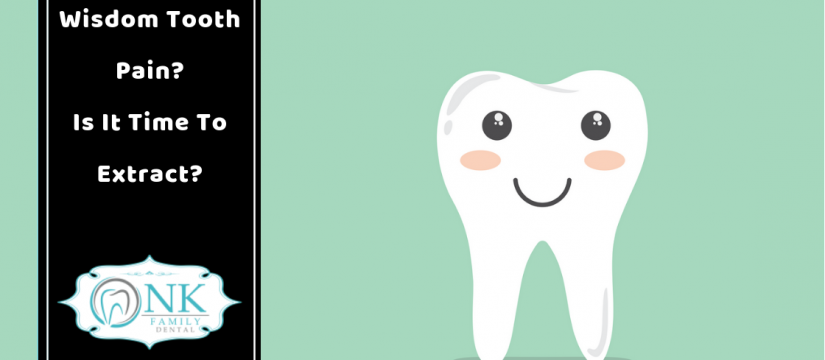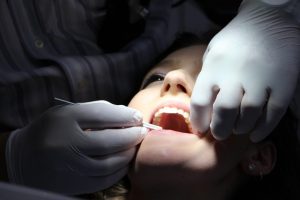
Wisdom teeth extraction is a common procedure that is necessary for 85 percent of people at some point in their lifetime. For those who experience pain or difficulty with their wisdom teeth, an extraction will restore both oral function and health. Learn about the symptoms associated with wisdom teeth, and why they should usually be removed.
Wisdom Teeth Symptoms
You may wonder how you’ll know when it’s time to have your wisdom teeth pulled. Our body does a great job of telling us when to seek medical attention. You are likely to experience some of the following symptoms indicating that it’s the right time. This is usually between the ages of 17 and 21 years old. Your dentist will make the diagnosis and help you schedule an appointment with an oral surgeon.
You may experience:
- Pain or irritation – Most often, people experience pain at the jaw, or where the jaw meets the ear. They may also have painful or swollen gums, which may be noticeably red or inflamed.
- Difficulty chewing – As wisdom teeth begin to breach the gum line, you may notice pain when chewing. Food may also get caught in between the top of the tooth and the gums, potentially causing decay if it can not be reached.
Cysts or mouth sores – On occasion, a person may have a cyst form on their wisdom teeth. Left untreated, this fluid-filled sac can damage the jawbone, teeth and nerves. Unfortunately, this can warrant the removal of tissue and bone, causing long-term complications. - Shifting teeth – As teeth grow in, they may take up too much space or come in incorrectly. In either case, a dentist will determine whether there is enough room to straighten them, or if teeth must be extracted to make room. Wisdom teeth are commonly extracted for both of these reasons.
- Sinus issues – While it does not occur frequently, the roots of upper wisdom teeth can grow in and push against your sinuses. This can cause uncomfortable pressure, as well as pain, headaches and congestion.
Do They Have to be Removed?
 Many people, despite the dentists orders, think that they can tough it through the pain, or forgo an extraction. However, if you opt to do so, you should understand the serious risks. If you are feeling pain due to wisdom teeth, one frequent concern is that they may be impacted. This means that there is not enough room for them to emerge from the gum line. Often, they will remain trapped ‒ in the gum or partially emerged ‒ or grow against other teeth.
Many people, despite the dentists orders, think that they can tough it through the pain, or forgo an extraction. However, if you opt to do so, you should understand the serious risks. If you are feeling pain due to wisdom teeth, one frequent concern is that they may be impacted. This means that there is not enough room for them to emerge from the gum line. Often, they will remain trapped ‒ in the gum or partially emerged ‒ or grow against other teeth.
Left to sit under the gum line, impacted teeth can cause severe decay or gum disease. An inflammatory gum disease called pericoronitis is also possible. They may eventually damage other teeth or cause them to shift, requiring orthodontic treatment.
What to Expect During Extraction
The only way to treat painful or incorrectly growing wisdom teeth is to have them extracted. If you have never had a tooth extracted, read our blog post, “Teeth Extractions – What You Need to Know.” However, wisdom tooth extraction is typically a more invasive procedure ‒ especially when teeth are impacted. Typically, you will undergo either local or general anesthesia to avoid discomfort during the procedure. If you undergo general anesthesia or IV sedation, you will need to have someone accompany you, since you will be groggy and unable to drive yourself home.
Length of time for the procedure depends upon your individual situation. Your oral surgeon will be able to give you an estimated timeframe. Be sure to ask the oral surgeon questions during your pre-surgery appointment, and discuss any anxiety you may be experiencing.
After the extraction, your surgeon will warn you of possible side effects, and how to handle them. One of the most common is dry socket. This is a potentially painful condition when the blood clot in the socket breaks loose, exposing the bone. If this happens, return to the oral surgeon immediately. Follow all of the surgeon’s recommendation and take the prescribed medication to avoid any complications.
At NK Family Dental, we take your oral health seriously. With state-of-the-art technology and an attentive staff, we are diligent about staying up-to-date on your individual needs and concerns. If you begin feeling symptoms associated with wisdom teeth, please contact us to schedule an appointment. We will be able to assess your situation and recommend the next steps you should take.
